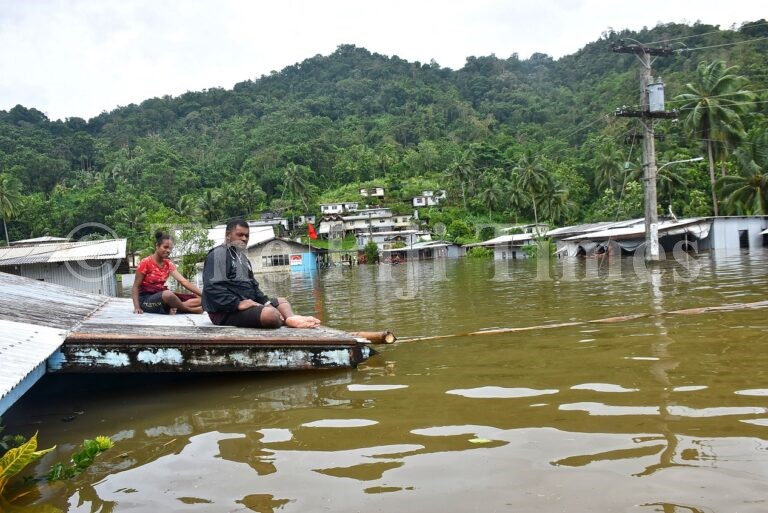GEOPOLITICS rivalries and disunity among countries continue to undermine efforts to mitigate the climate crisis.
And Fiji stands at a crossroads in this fight, as Prime Minister Sitiveni Rabuka continues to promote the Pacific as a region of peace.
Mr Rabuka said this in Parliament while delivering his ministerial statement on the proceedings of the 28th Conference of Parties (COP28) held in Dubai, United Arab Emirates, last year in his capacity as PM and Minister for Environment and Climate Change.
He said the region continued to experience frequent and extreme rainfall events to unseasonable droughts, intensified cyclones, and higher average temperatures, changes which were disorienting for the those living in the Blue Pacific.
“At the same time, we experience different localised permutations of the climate threat depending on where we are, how we live, and what we depend upon,” he said.
“What is constant in the complexity of this crisis is the collective effort of Pacific leaders to build unity and mobilise action to protect our collective future.”
Mr Rabuka also lamented how rife political rhetoric was, and that global co-operation had faltered at a time when “we need it most”.
He said geopolitical rivalry remained a core driver of many interests, and rather than finding motivation and common purpose to combat the shared suffering of the climate crisis, loss of biodiversity and reduction of damage to livelihoods, many large economies remained focused on short term gain and inter and intra-regional competition.
“This is why I continue to bring attention to the broad concepts of peace and security which must underpin our regional and global vision. Rivalry and disunity are undermining efforts to address climate change at the scale required.
“So, when it comes to concepts of peace and security and the need for our region to share these aspirations – I speak to issues of geopolitics and climate change as one and the same.”
Mr Rabuka said COP28 had determined that the world was not on track to keep the global average temperature rise below 1.5 degrees Celsius.
And while this might not be perceived as a lot for some nations, Mr Rabuka said in the Pacific, the difference between 1.5 and 2 or 3 degrees was the difference between habitability of our island homes and forced migration.
“It is the difference between catching your own fish and growing your family’s food or being wholly dependent on imported protein.
“It is the difference between economic sovereignty and fully fledged dependence on external aid and disaster relief. Here in the Pacific, the difference is not subtle – the difference is a knife edge.
“The Pacific must continue to present the voice of pragmatism and influence those that appear increasingly committed to disunity and ultimately, self-harm.”
Mr Rabuka also informed the House that the final decision text agreed upon in Dubai — the UAE Consensus — documented the lack of progress made to date, and made explicit reference to fossil fuels.
“To ramp up our own efforts to decarbonise our economy we need to be clear on why we are pursuing decarbonisation in Fiji.
“Fiji is heavily dependent on imported fossil fuels and as such, we are exposed to the increasing oil price volatility we see annually. The price of oil impacts all aspects of our daily lives.
“While we must be practical about how and where renewable alternatives will be viable, we know that there is huge benefit that is largely untapped.
“We must be pragmatic when it comes to decarbonisation, we must focus on transitioning energy systems in ways that build resilience and increase economic independence.”
The Prime Minister said Government would accelerate adaptation programming this year to build resilience and would focus on several priorities.
These are: delivering against the Strategic Implementation Roadmap for Fiji’s Climate Change Act to boost collaboration across sectors, increasing access to financing through the new Loss and Damage Fund, the Pacific Resilience Facility, and other international climate finance mechanisms.
Apart from this, Mr Rabuka said Fiji would also engage in global negotiations on the new quantified collective goal for climate finance in preparation for COP29.
He also extended his gratitude to all members of the Fiji delegation to COP28, including Speaker of Parliament Ratu Naiqama Lalabalavu, Cabinet Ministers, and Leader of Opposition Inia Seruiratu.
Mr Rabuka said addressing climate change and preventing further harm to the people of Fiji was a bipartisan priority that should be above politics.
In response to the statement, Mr Seruiratu said Fiji’s role in the wider Pacific Small Island Developing States (PSIDS) and Alliance of Small Island States (AOSIS) was very critical.
Ahead of the SIDS4 meeting in Antigua and Barbuda next month, Mr Seruiratu said 2024 was a very critical year for SIDS.
“May I remind Government, let us not only concentrate on adaption. Adaption is for our survival, but mitigation is important in every aspect where we can do mitigation, that is always recommended because more mitigation now means lesser adaptation in the future,” he said.
“Although the priorities have not changed in terms of the SAMOA Pathway, the Barbados Action Plan and the Mauritius Strategy, but what worries us is that the situation has gotten worse.
“There are special circumstances for SIDS, and that is why Antigua and Barbuda this year in May is so important for the AOSIS.”
He also urged the Prime Minister that the Pacific needed a strong voice at this meeting.






